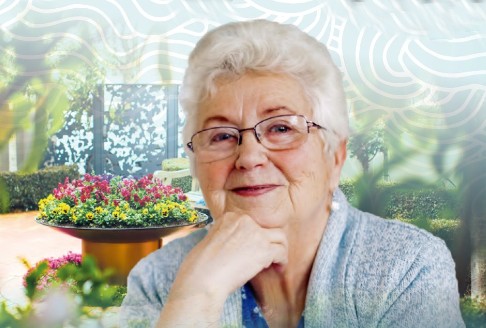Barbara and Sam's story: Baptcare Karana Residential Aged Care Community
- 26 Mar 2021

“I could see how good Karana was, so after my husband died, and I’d been living alone for ten years, I thought it would be nice to come here.”
When it came time for Barbara to move into Residential Aged Care, she knew she wanted to be a part of the Karana community.
Barbara: I’d grown up in the area and I used to visit a friend who was living here. I’d take her to listen to
Sam (Samantha Lo, Baptcare Spiritual Care Coordinator and Chaplain) playing the harp. I could see how
good Karana was, so after my husband died, and I’d been living alone for ten years, I thought it would be
nice to come here. I liked the gardens, and the people. I was a Methodist and was familiar with the local
Baptist Church, so I decided this was the place for me. I like to join in, so I go to anything that’s on here:
exercises, Bible group…
Sam: Barbara always does the Bible readings for us in chapel services.
Barbara: I can’t sing or play the piano, but I can read. I used to do a lot of reading for The Blind Institute; reading books that students needed for their studies. I lived not far from Latrobe University, so I’d go to the library there and record myself. I reckon I was learning a lot too.
Sam: We have a Bible ‘study’ group, with reading, conversation and, of course, coffee and cake! It’s very popular and includes people from different faith backgrounds. It’s a good way for new people to join a group that’s not too big, get to know a few people and feel a sense of belonging. Barbara is very good at drawing out other people’s stories; inviting other people to speak.
Barbara: I learnt that from being a teacher. Sometimes you know people have something to say; they just need to be encouraged. It’s good to hear different views.
Sam: If I’ve got a new person, and I know they might be a bit overwhelmed, I just have to word up Barbara and a few of the other ladies, and say, “Can you take them under your wing?”
It’s one thing for me to come alongside a new person, but it’s a whole new level for a peer to come alongside. I can only imagine what it’s like to leave my own home and move into Karana. They know.
Barbara: It’s just being friendly. Letting people know that there are certain things on that they might enjoy, like the hymn singing, discussion groups, Friday night harp concerts with Sam… I don’t know what we’d do without Sam.
Sam: It goes both ways. The way Barbara thinks and acts, and lives her faith, is extraordinary. And with the wider Bible study group, sometimes I’ll ask them to pray for me, like when I have a funeral coming up.
The compassion and inclusion of the Karana community is exemplified by their Memory Garden, which has become a tradition that allows residents and staff to share memories and show their love and support for each other.
Sam: The Memory Garden started when a resident, Marion, said she’d love us to plant a red geranium after she died, “so you don’t forget me.” So now, when somebody dies, I’ll invite the family to come and plant something. It’s also a way for residents and staff to say goodbye.
Barbara: It’s lovely to have a garden where memories can continue on.
Sam: We had two sisters here, Pat and Joyce, who’d always lived together, and who kept to themselves at Karana. When Joyce died, Pat was on her own. I invited some residents to join in a memorial service and rose planting in the garden, and they all turned up so Pat would know she wasn’t alone. Pat was staggered that people, even ones she didn’t know, would turn out to show their love. This year, the mum of our chef MJ, died in Iran of COVID-19. I asked MJ if she’d like something planted in the Memory Garden. With her blessing, we welcomed staff and residents to attend, and so many came. It was phenomenally powerful for MJ to feel the love from all those people that day.
Barbara: It was very moving. We felt lucky to do that; to be able to be with her.
Sam: At the end, MJ said, “I haven’t got my family in Australia but today you’ve become my family.”
It’s that spirit of community and empathy that makes Karana such a good fit for Barbara.
Barbara: I’m glad I made the decision to come to Karana. I have no regrets. It’s a great place to live.
Community news
-

Back to School Tips for Foster and Kinship Carers
Heading back to school can be exciting, but it can also bring up big feelings—especially for kids in care. Here are a few simple ways to help make the transition smoother.
- 17 Apr 2025
-

Easter Reflection from Emily Booth of our Spiritual Care Team
A few years ago, at Easter, I was staying with my sister and her family for the weekend. One afternoon we were all sitting around chatting and the kids were playing when my sister came into the room and placed a tray of fresh, warm hot cross buns on the table
- 16 Apr 2025
-

Student Volunteer Spotlight - Erin
Did you know that Baptcare has student volunteers at some of our Residential Aged Care communities? Our volunteers are an integral part of our Baptcare community, not only in residential aged care but across many of our programs and services. Volunteers provide essential connection, positivity and assistance to residents, clients and consumers.
- 04 Apr 2025
